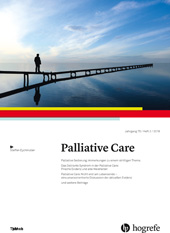Vorausplanung am Lebensende – eine kritische Reflexion für die Praxis
Abstract
Zusammenfassung. Die Vorausplanung basiert auf Vorherwissen, und das ist nicht mehr (und nicht weniger) als der Umgang mit Wahrscheinlichkeiten. Hier braucht es medizinisches Prognose-Wissen, und die Kompetenz, dieses zu kommunizieren. In der Medizin wird die Vorausplanung aktuell zunehmend zu einem elementaren Recht als Ausdruck der Umsetzung der Patientenautonomie erkoren – doch welche Inhalte können bzw. müssen in diesem Rahmen diskutiert und definiert werden? Die Terminologie zum Thema gesundheitliche Vorausplanung ist national und international uneinheitlich. In der Schweiz wurde deshalb mit dem neuen «Rahmenkonzept gesundheitliche Vorausplanung» der Versuch unternommen, diesbezüglich zu einem einheitlicheren Verständnis beizutragen. Für die klinische Praxis kann man zusammenfassend sagen: Die Vorausplanung bedarf folgender Attribute: Vertrauen, gemeinsames Erleben gesundheitlicher Krisen und des Umgangs damit, kommunikative Fähigkeiten aller Beteiligten (nicht nur seitens der Medizin!), ein Rollenverständnis der Medizin zwischen Coach und Bergführer, ein systemischer Ansatz mit Einbezug der Angehörigen in wichtige Entscheide, ein etabliertes, und bis zur elektronischen Dokumentation bestens funktionierendes regionales Gesundheitsnetz, eine volle Kostendeckung der teilweise sehr anspruchsvollen Entscheidungsfindungen, Dokumentation und Revision – und von allen das Bewusstsein und Selbstrelativierung, dass es sich bei der Vorausplanung nicht um Gewissheiten sondern um Wahrscheinlichkeiten handelt.
Abstract. Advance planning or anticipation in health care is based on prognosis, and that is no more (and no less) than dealing with probabilities. Knowledge about prognostic factors in medicine is needed here, and competencies how to communicate it. In medicine, advance planning is currently more and more regarded as an elementary right as an expression of the implementation of patient autonomy – but what content can or must be discussed and defined? The terminology on the subject of “advance planning” is inconsistent both nationally and internationally. In Switzerland, therefore, an attempt was made to contribute to a more uniform understanding in this respect with the new “framework concept for advance planning in health care”. For clinical practice it can be summarized as follows: Advance planning requires the following attributes: Trust, shared experience of health crises and how to deal with them, communicative abilities of all those involved (not only on the part of medicine!), an understanding of the role of medicine between coach and mountain guide, a systemic approach with the involvement of relatives in important decisions, an established regional health network that functions perfectly up to the electronic documentation, full cost reimbursement of the sometimes very demanding decision-making processes, documentation and revision – and of all the awareness and self-reflection that advance planning is not about certainties but about probabilities.



